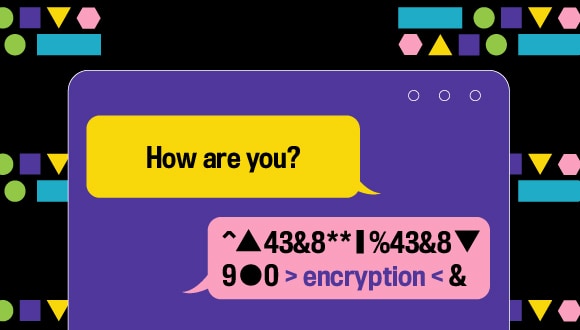Encryption plays a very important role in protecting your information and data online. Encryption hides specific information from everyone except the intended recipient(s). Many people interact with encryption without realizing it, like when online banking or sending an email. This blog post will tell you about encryption, the different purposes it serves and the ways you can use it to be more cyber safe.
Decoding encryption?
Encryption scrambles information when it is moving from the sender to the recipient to prevent unauthorized people, like cyber criminals, from accessing it. If you send an encrypted message to someone, it will be secured with a secret key that only the rightful recipient can use to uncover it. The secret key is a piece of code that will only work for the correct recipient’s device or account. Even if someone else tried to read the message, they wouldn’t know what it says without having the secret key.
Purposes
Encryption has many benefits for sharing data online, especially sensitive information. It helps to reduce the risk of identity theft or fraud. It also prevents cyber criminals from stealing sensitive personal information being sent electronically to organisations such as banks or online retailers. Encrypted websites that use HTTPS ensure that people can’t access information when it is being sent from your device to the website and back again.
Did you know that when data is encrypted while stored, it is referred to as “at rest”, and when it is encrypted while travelling from one place to another, it is “in transit”?
Using encryption
There are many ways encryption secures your information online.
- When browsing: To browsing the internet securely, make sure the websites you visit have HTTPS and a padlock icon in front of the URL, which means that the website is encrypted.
- When sending emails: Use email services and messaging applications that offer end-to-end encryption to keep your information encrypted from sending to receiving the message.
- When using public Wi-Fi: Virtual private networks (VPNs) are a great way to protect your information, especially when using public Wi-Fi.
- When sending sensitive information: Remember to evaluate the sensitivity of the data you want to share to determine if it should be encrypted. You should always use a personal network (home Wi-Fi), a VPN and applications that support encryption when handling sensitive information like your social insurance number (SIN), credit card information or other personal information
Conclusion
Encryption helps protect you from cyber criminals and safely transports and delivers your most sensitive information to its destination. It is an important layer of cyber security for your online accounts and data. By understanding and using encryption when you need it, you can keep your sensitive information safe from falling into the wrong hands.
